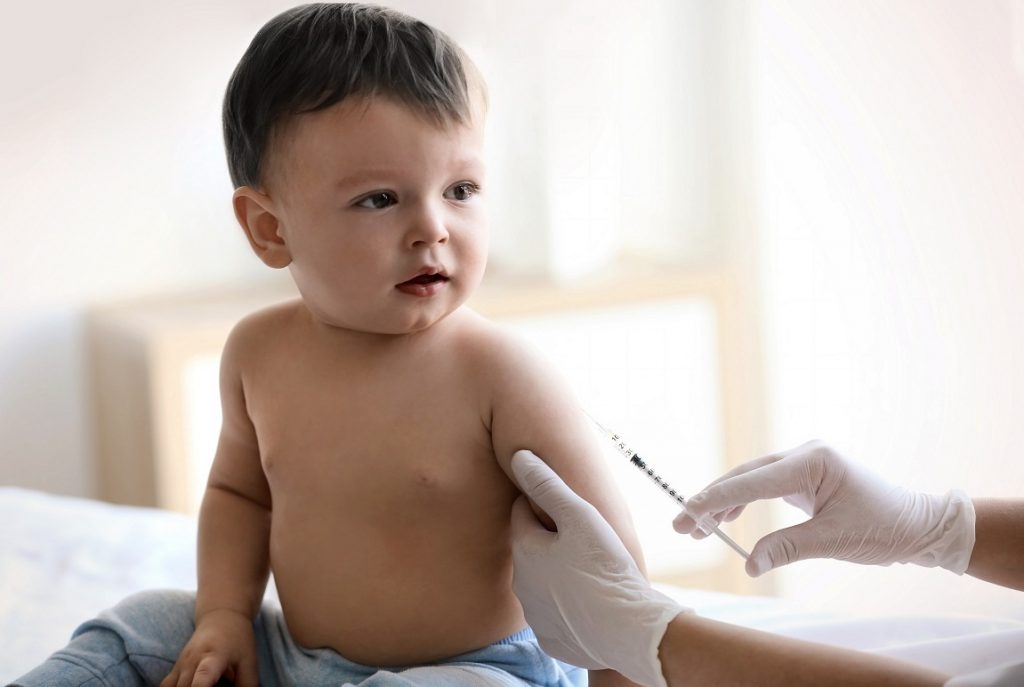VACCINATIONS: YOUR CHILD’S FIRST PROTECTION

It is crucial that all the recommended vaccinations for children are given at the right stage of your doctor-approved vaccination schedule. Although the timing for each child vaccination shot may differ according to the age and location, our medical team at Apollo Cradle & Children’s Hospital will ensure that you are kept informed of each immunization that is due. Additionally, our team is also well equipped to handle any specialized needs of your child and provide relevant treatment in the event your child suffers for any adverse reactions.
FAQs 1. How do vaccines work?Vaccines help your child’s immune system fight off infections efficiently. They do so by sparking the response of their immune system to specific diseases. So, if the bacteria or virus tries to invade their body in the future, the immune system will already know how to protect the body against it.
2. What diseases do vaccines protect against?Through vaccinations, you can immunize your baby against the following serious diseases:
- Chickenpox
- Diphtheria
- Hepatitis A
- Hepatitis B
- Influenza
- Measles
- Mumps
- Polio
- Rotavirus
- Tetanus
- Tuberculosis
- Whooping cough and others
Vaccines are generally very safe. It is far more likely for your child to be hurt by a disease that is vaccine-preventable, than by a vaccine. All vaccines have to go through a rigorous procedure of safety testing. This also includes conducting clinical trials before approving them for clinical use.
4. Will breastfeeding protect my baby from infectious diseases?There are some antibodies present in the breast milk that can be passed to the baby, especially in a couple of days after birth. However, after a few weeks, this passive immunity starts wearing off. After this, breastfeeding provides little to no protection from serious infectious diseases. Therefore, even if you are planning on breastfeeding long-term, you have to get your child vaccinated.
5. Can my baby handle all of these vaccines?Yes. Some parents are worried that so many vaccinations can overload the immune system of your child. However, it is important to note that your child is exposed to thousands of germs every single day. A sore throat or a common cold will put more stress on the immune system of the child than vaccines.
6. What if my baby is taking antibiotics? Can they still get vaccinated?Yes. Even if your child has a low-grade fever, a mild illness and is taking an antibiotic, he or she can still get vaccinated. If you are unsure, talk to your pediatrician about it.
7. Can I delay the vaccine schedule?Following the recommended vaccine schedule is one of the best ways of protecting your child against serious infectious diseases. Every time you delay a vaccination, you are putting your child at risk. If for some reason, delaying the vaccine schedule is inevitable, you can talk to your paediatrician regarding the adjustment.
8. Do vaccines have side effects?Vaccinations are mostly safe and usually, babies don’t usually have any side effects from the immunization. However, some children may have side effects to certain vaccines. They are usually minor and go away in a few days. Here are some of the common side effects a child might face:
- Low-grade fever for a few days after the vaccinations. The doctor might recommend paracetamol drops to relieve the symptoms.
- BCG – A lump starts appearing about 3 to 4 weeks after the BCG. In about 2 weeks, it will soften and discharge on its own. There is no need for medication. However, a small scar can be seen at the site. If the swelling does not subside, you need to contact your pediatrician immediately.
- HIB/Typhoid vaccine – In this case, there can be a mild fever of pain. The doctor might recommend paracetamol syrup.
- Measles/MMR – After this vaccination, some children get a fever in about 4 to 10 days. This can be accompanied by a cold, cough, and mild rash.
- DPT (Triple Antigen) – At the site of the injection, there can be pain, fever, swelling, and redness. For a few weeks, your child may have a small, painless bump. If your baby is crying or screaming continuously and the fever has reached more than 102 F, you need to consult your paediatrician.
- If your baby is getting cranky because of discomfort and fever, comfort and shower them with attention.
- Don’t hesitate to check with your paediatrician if you have any worries.
- It is extremely important to follow the schedule of the vaccination and administer your child accordingly. If you miss a vaccination appointment, consult your paediatrician about it. They will recommend a suitable alternative date.
- If on the day of the vaccination, your child has an ongoing fever, consult with your paediatrician. There might be a need for rescheduling the vaccination date.
- In some cases, the paediatrician may provide you an option of choosing from a painful or a painless vaccination. Make sure that you discuss all the options with your pediatrician.
- After the vaccination, your child might have a fever for a couple of days. You can try giving a sponge bath to reduce their temperature. However, if the fever is not going away in a couple of days, you need to consult your pediatrician immediately.
- Whenever you take your child to the hospital, please take the record of vaccinations with you. The doctor dates and signs every vaccination as well.
- For the vaccination, take your partner or any other family member to assist you with the child. They can help distract and comfort the child. Also, you can try taking some toys or games to distract and relax them during the vaccine administration.